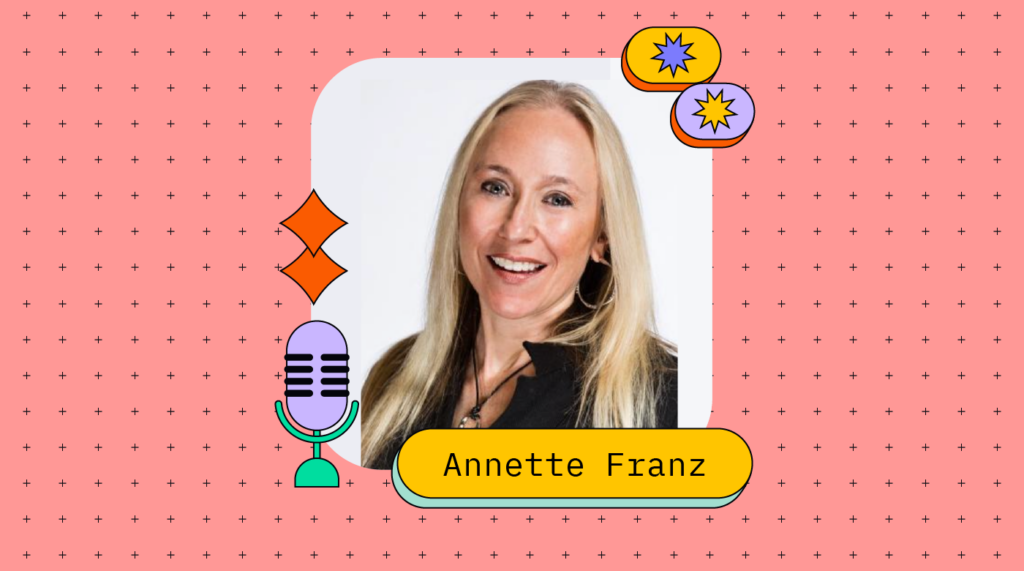Annette Franz has over 30 years of experience as a leading customer experience consultant, speaker and author. Most in the field know her from her seminal book Customer Understanding: Three Ways to Put the "Customer" in Customer Experience (and at the Heart of Your Business). She's received numerous prestigious awards for her work driving engagement, retention, and satisfaction for a wide variety of enterprise clients.
Tell us the story of how you got involved in customer experience. How did your career lead you here?
A great title for my story is Farm to (Executive) Table. Here goes…
I grew up on a farm in Ohio. I’m an animal lover through and through and, as a young girl, had dreams of becoming a veterinarian. An intense dislike for Chemistry courses, of which six were required to get into vet school, and a serious fainting reaction to the sight of blood woke me up from that dream. After completing three years of Animal Science study at the Ohio State University, I moved to southern California and completed my degree in management at California State University.
My love of math and writing came into play when I saw a posting for a position with J.D. Power and Associates, and 30+ years of career progression (from analyst to executive) through a variety of firms on both vendor and client sides later, I continue to call this customer experience space home.
In 2011, I started my blog at CX Journey as a way to share my passion for all things customer experience, to help companies not only understand the importance of the employee experience and its role in delivering an exceptional customer experience but also transform their cultures to ensure the customer is at the center of every conversation.
In 2017, after having more fun working on side projects than my day job, I became founder and CEO of CX Journey Inc., a customer experience strategy consulting firm. I help executives in client organizations develop customer-centric cultures where employees and customers are put before everything else.
In which industries, verticals or sectors have you focused your CX career?
I’ve worked with clients in pretty much every industry. And as a practitioner, I was in CPG, financial services, and tech.
Why do so many companies struggle with making CX a priority? What are some common mistakes companies make?
Companies struggle to make CX a priority because their leaders don’t make CX a priority. It comes down to the individual leaders and their belief in what’s important. And sadly, too many are still living the old management adage that the purpose of a business is to maximize shareholder value. Shareholder value is an outcome. You’ve got to focus and prioritize the means to achieve that outcome… the means are a customer-centric culture, a great employee experience, and a great customer experience. Sadly, too many leaders believe there are too many competing priorities that don’t allow them to focus on the customer experience. Clearly, there are no priorities that compete with your employees or your customers. Without either of them, you have no business.
You’ve been selected to give a keynote address at a major CX conference. What topic will you discuss and what major points will you touch on?
I would talk about transforming the customer experience from the inside out. The key points I’d touch on are:
• Culture is the foundation of this transformation
• Fix the culture, fix the outcomes
• Leadership commitment and alignment are critical
• Employees come more first (EX drives CX)
• Customer understanding is the cornerstone of the customer-centric culture (but it must be shared and acted upon by the right people)
Have you seen, firsthand, any AI impacts on the practice of CX? What impacts are you expecting in the next few years?
I have seen it impact the practice of CX. It’s streamlined processes, helped professionals gain deeper insight into customer behavior, and has aided in designing and delivering a more personalized and orchestrated experience for customers, to name just a few things.
What skills have served you best in your CX career?
I think these are some of the skills that have served me best…
• Market research
• Critical thinking
• Analytical skills
• Problem solving
• Design thinking
• Change management
• Communication
• Sales/influencing
• Educating
• Relationship-building
• Entrepreneur/self-starter
What’s the best advice you’d give someone just starting out in their CX career, or just starting to transition from a related discipline like call-center or customer service management?
Read, listen to podcasts, attend webinars, network, talk to others in the industry/field, join the CXPA. Take the time to educate yourself and learn what a career in the CX profession truly entails.
When did CX as a discipline pop up on your radar? How have you seen it evolve or change over that period of time?
I’ve been in the profession for 31 years… before it was even called “customer experience!” It has evolved a lot over the years. Back in the day, we talked about customer satisfaction and customer loyalty. It’s the same work we do today, but it’s now got a name… and perhaps a lot more structure and detail to it. There used to be debates about whether VOC and CX were the same thing when the term (CX) first came about. I laugh about those conversations because they are clearly very different; one is vital to the other.
What trend do you think will be most impactful in (your niche of) the CX space over the next three years?
I’m not big on trends. I think too many people chase shiny objects (the latest trends), when they still need to get the basics, the foundational elements, right. Having said that, and it’s not even a trend but a reality now, AI will continue to impact all aspects of this field/discipline.


